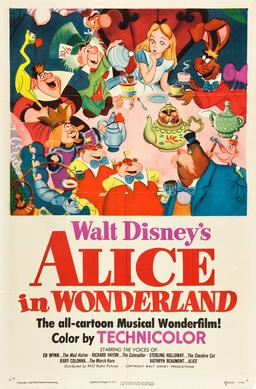title: Alice in Wonderland and the theft of the public domain layout: post date: 2020-08-24
noindex: true
Disney’s Alice in Wonderland is one of my favorite movies and an undisputed classic. After its release in 1951, Alice holds a fond place in billions of children’s hearts, over almost four generations. And it has been stolen from those generations, as part of the theft of one of these generations' greatest treasures: the public domain.

I often use this film as an example when arguing about copyright. Almost everyone I speak to was born well after the film’s release (in fact, this is true of almost everyone alive today), but they remember it fondly regardless. Many people I’ve spoken to would agree that it even played a formative role in their childhoods; it’s a film dear to many hearts. My mom is very fond of the Cheshire Cat in particular, and owns quite a bit of relevant merchandise.^1
Like many films from their “Golden Age”, Disney’s Alice is itself a derivative work, based on Lewis Carroll’s 1865 book. However, Disney’s film won’t enter the public domain until 2046, and until then, no one can create derivative works of their own without receiving permission from and paying a tithe to Disney. And if modern-day copyright law, bought and paid for by Disney, had been in force at the time Alice in Wonderland was made, they would have released their film 17 years before Carroll’s novel entered the public domain.
Carroll, who died in 1898, was 53 years dead when the film was released. Everyone who is listed in the credits for Disney’s Alice in Wonderland is also dead, with the exception of Kathryn Beaumont, who played the role of none other than Alice herself.^2 She was 12 years old at the time. And still today, the copyright remains in force, though no creators remain to enjoy its privileges. It shall remain so for another 26 years, when I can finally celebrate my Alice-in-Wonderland-themed 53rd birthday party, having been robbed of the privilege at age 11.^4
Copyright was established in the United States to incentivize artists, musicians, authors, writers, and other creatives to create novel art, allowing them to enjoy the exclusive rights to it for a short period^5, then ultimately enriching the public domain. The obscene copyright terms we’re faced with today have robbed the American public of its national heritage. Any work made today will not enter the public domain during the lifetimes of any of its contemporaries, let alone soon enough for those contemporaries to do anything with it.
A system designed to incentivize creation has become a system which incentivises the opposite: rent seeking. A rent which is sought from the American public, in exchange for which we’re no longer getting our end of the deal.
Well, the deal is off.